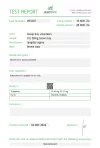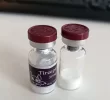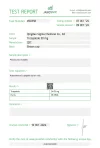Qingdao Sigma Chemicals
Subscriber
3rd party testing of Tirz 30mg GB brown tops by volunteers


2nd party testing associate was : Janoshik Analytical



2nd party testing associate was : Janoshik Analytical

Follow along with the video below to see how to install our site as a web app on your home screen.
Note: This feature may not be available in some browsers.



Stop bothering assistants with this as I am also waiting for a refund of an option that I paid for and was not able to be sent to me? No offense, but how about you act more as a merchant and less as a kebab shop owner? 5 days to get a refund for an item and an update to the matter in general, that's what I am waiting for, I am not bothering anyone after the payment was successfully done.We don’t confirm payments.
Your confirmation will be the tracking number.
Stop bothering the assistants with this, if it’s confirmed in blockchain then it’s confirmed
Stop bothering assistants with this as I am also waiting for a refund of an option that I paid for and was not able to be sent to me? How about you act more as a merchant and less as a kebab shop owner?
Anyone using the 60/3 tirz/sema blend? Thoughts ?

Lol my guyI know what your kebab will be filled with. That brown stuff is not meat, nor is that likely white yogurt sauce....
Dunno, but just ordered some since I am already moving out of the 7.5mg levels of a previous QSC order
Understanding Why Peptides Should Not Be Mixed in the Same Vial or Syringe | Dripdok Help Center
Why you shouldn't mix peptides in the same vial or syringe.intercom.help
@Ghoul, how will this impact my bulk importation of Tracy's promo Facial Microneedling Serum Yeast Freeze-Dried Power Skin Care Set Shrink Pores Moisturizing Brighten Anti Aging Peptides Essences?These small packs from China come in big containers from package consolidating logistic companies, with tens of thousands of others, think Temu and Shein.
The logistics company electronically submits a list to customs of every pack, listing sender, recipient, contents, and value,
If the company has a good reputation, the whole container bypasses customs. If the occasional random inspection turns up contraband or false declarations enough times, they get a fine, and if it continues, they're suspended from being able to bypass customs. Then all their containers get inspected, which can delay shipments by months, and no Chinese company will use them to ship, costing them millions a day.
That's why, when discovered before reaching the US, UGLs get their packs returned by the shippers and they have to find new companies to use.
The new de minimus rules coming into effect require a much more detailed customs declaration (ie, not "t-shirt", but "cotton and nylon v-neck t-shirt manufactured in China" ), along with details about who it's coming from. This detailed data is necessary to charge duties and tariffs in the future, and to blacklist sketchy shippers.
Customs is spot checking these declarations much more closely now, and handing out suspensions to logistics companies that have falsely declared packages in their container. (this data comes from whoever is sending the package).
In turn, the logistic companies are getting more strict with which customers are allowed to send packages through them, because a tiny number of packs containing contraband threatens their business.
Some ppl are too dumb for gear.@Ghoul, how will this impact my bulk importation of Tracy's promo Facial Microneedling Serum Yeast Freeze-Dried Power Skin Care Set Shrink Pores Moisturizing Brighten Anti Aging Peptides Essences?
Some peptides play well together, right? Like cagrilintide and semaglutide, I expect. Do we know that there's an issue with tirz/sema? BPC/TB500?
Understanding Why Peptides Should Not Be Mixed in the Same Vial or Syringe | Dripdok Help Center
Why you shouldn't mix peptides in the same vial or syringe.intercom.help
@Ghoul, how will this impact my bulk importation of Tracy's promo Facial Microneedling Serum Yeast Freeze-Dried Power Skin Care Set Shrink Pores Moisturizing Brighten Anti Aging Peptides Essences?
Some peptides play well together, right? Like cagrilintide and semaglutide, I expect. Do we know that there's an issue with tirz/sema? BPC/TB500?
A few anecdotes on Discord testify to it's awesome feelz and effectiveness..Anyone using the 60/3 tirz/sema blend? Thoughts ?
What about BPC/TB it has been sold as a mix for quite a while now


What about BPC/TB it has been sold as a mix for quite a while now

My 5 min time cost is higher than that
Half million a year ain't bad for a sales gig, but the hours must be a motherfucker.
In other news, I apparently participated in a tirz promo and are now well stocked for my forthcoming cut.
Here's my strategy:
- Order product
- Promptly forget that I order product
- Be surprised by the arrival of fun new gear
Being old is great. Only thing is, don't order strange white powdery substances from multiple vendors at the same time. Occasionally I buy industrial chemicals and well.... Don't want to inject that.
Label on arrival is an absolute must. The #1 safety practice.
definitely a scam. I get these several times a week. ignore it.Ordered domestic hgh last monday(9 days ago) and just got this text this morning. Not sure if its QSC, the post office in Asia, or a scammer. Have you guys gotten anthing similar from QSC? The link redirects me to usps website titled xo7q4.asia

